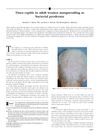Cicatricial Alopecias: Diagnosis and Treatment Complexities
July 2012
in “
Springer eBooks
”
cicatricial alopecias scarring hair loss central centrifugal cicatricial alopecia lichen planopilaris topical steroids intralesional steroids hydroxychloroquine methotrexate cyclosporine mycophenolate mofetil minoxidil hair transplantation chronic cutaneous lupus erythematosus dissecting cellulitis of the scalp folliculitis decalvans CCCA LPP DLE DCS FD Rogaine

TLDR The document concludes that more research is needed to better understand and treat scarring hair loss conditions.
The document from 2012 addresses the complexity of diagnosing and treating cicatricial alopecias, a group of disorders characterized by scarring hair loss. It outlines the North American Hair Research Society's classification of primary cicatricial alopecias and discusses the clinical features and treatment options for specific types such as central centrifugal cicatricial alopecia (CCCA) and lichen planopilaris (LPP). Treatments range from topical and intralesional steroids to systemic agents like hydroxychloroquine, methotrexate, cyclosporine, and mycophenolate mofetil, with minoxidil suggested as an adjuvant therapy. Hair transplantation is considered for stable disease. The document also addresses the treatment of related conditions such as chronic cutaneous lupus erythematosus (DLE), dissecting cellulitis of the scalp (DCS), and folliculitis decalvans (FD), recommending a therapeutic ladder approach. It concludes with a call for more research to improve the understanding and management of these challenging conditions.


















